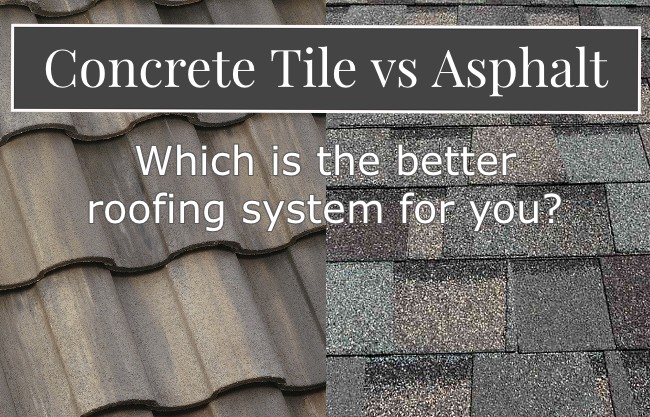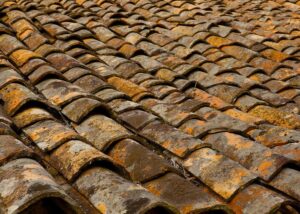Introduction
Concrete and asphalt roofs are two of the most common types of roofing materials. They come with their own pros and cons, which you should consider before deciding on your next roofing project.
Concrete tiles are made from cement, sand, coloring and water. The mixture is pressed into tile molds and cured to the desired hardness. Concrete tiles have been used across Canada since the early 1970’s. Manufacturers like BC Tile, Unicrete and Marley installed tens of thousands of roofs and most are still installed, protecting homes and saving homeowners thousands of dollars a year.
Asphalt shingles are made from bitumen–a type of petroleum product–and recycled rubber tires that have been ground up into small pieces called granules. The granules are mixed together with liquid asphalt to create an adhesive substance that’s applied directly onto the roof decking underneath it; this helps keep water out while also providing additional insulation against heat loss through conduction or radiation.
Concrete Roofs
Concrete roofs are highly durable, fire resistant, and require little maintenance. They also offer a number of other benefits that make them an attractive option for your home or business.
Concrete tiles are made from natural materials such as limestone, sand and cement, which make them energy efficient in addition to being cost-effective over time. Concrete is not only far more durable than asphalt, but it’s also easy to clean; you can hose it down or use a power washer without damaging the surface of your roofing material!
Asphalt Roofs
Asphalt roofs are lighter weight than concrete tiles, so they’re easier to install. They also come in a wide range of colors and textures that can add interest to your home’s exterior. Asphalt roofs have been around for decades, so you’ll find them at most hardware stores and large home improvement centers.
Pros and Cons of Concrete Roofs
Concrete roofs have many advantages over asphalt roofs. They are more durable and fire resistant, require less maintenance, and are more energy efficient.
Concrete roofs have a triple lifespan than asphalt roofs because they don’t need to be replaced as often due to weathering or damage from storms. They also resist fire better than asphalt shingles do; if your home is in a wildfire prone area, the concrete roof will prevent the house from catching fire. You can rest assured knowing that your family will be safe inside their home for much longer than if it were an asphalt shingle roof.
Concrete tiles also require very little maintenance compared with other types of materials used in construction today, such as wood or metal shingles because they don’t rot away like wood does when exposed over time (or rust like metal). This means less work for homeowners who want peace-of mind knowing that their investment won’t need constant upkeep throughout its lifetime!
Pros and Cons of Asphalt Roofs
Asphalt roofs are lighter in weight than concrete, which makes them easier to install. They also cost less and can be installed with less labor. However, asphalt roofs have a shorter lifespan 12-15 years than concrete roof tiles because they don’t last as long in extreme weather conditions like rain or snow. Asphalt shingles may need to be replaced more often than other types of roofing materials as well.
Environmental Impact of Roofs
Concrete roof tiles are a more environmentally friendly choice than asphalt roofs. They have a lower carbon footprint, are more energy efficient, and require less maintenance.
Concrete roof tiles have a smaller carbon footprint than asphalt roofs because they’re made of natural materials that don’t require extensive processing. The manufacturing process for concrete is also much cleaner than it is for asphalt shingles–concrete doesn’t require any chemicals or additives during production like some shingle manufacturers do. These factors all contribute to lower greenhouse gas emissions from your home’s energy consumption when you choose concrete over asphalt shingles!
Asphalt shingles are less energy-efficient because they’re made from petroleum products like coal tar pitch and oil shale residue; these materials are highly combustible, so when exposed to heat from sunlight they can release toxic fumes into the air around them. Being installed directly to the roof deck can impact the breathing of the roof, leading to mold growth on the attack side of the roof.
Concrete Roofs
Concrete roof tiles are made with natural materials such as sand and water. This means that they contain no petroleum products or other toxic chemicals.
Concrete is also much more durable than asphalt shingles and can last up to 80 years before needing replacement (asphalt shingles have a lifespan of about 20 years). Concrete roofs don’t need to be replaced as often because they’re more resistant to weather damage like heavy snow and UV rays from the sun.
The Bottom Line
When you’re deciding whether to go with a concrete roof tile or asphalt roof, it’s important to consider all perspectives. While you may have your own reasons for wanting one over the other, it’s also worth considering what others will think of your choice.
Concrete roof tiles are an attractive and practical option for homeowners who want a low-maintenance roof that stands out from the crowd. They’re durable and versatile and can be used on a variety of styles of homes. If you’re considering concrete tile for your next project, we hope our guide has been helpful!
To learn more about the benefits of a concrete tile roof, contact us at sales@tileroofscanada.com or call 888-817-7668. One of our experts will be happy to help answer your questions.





